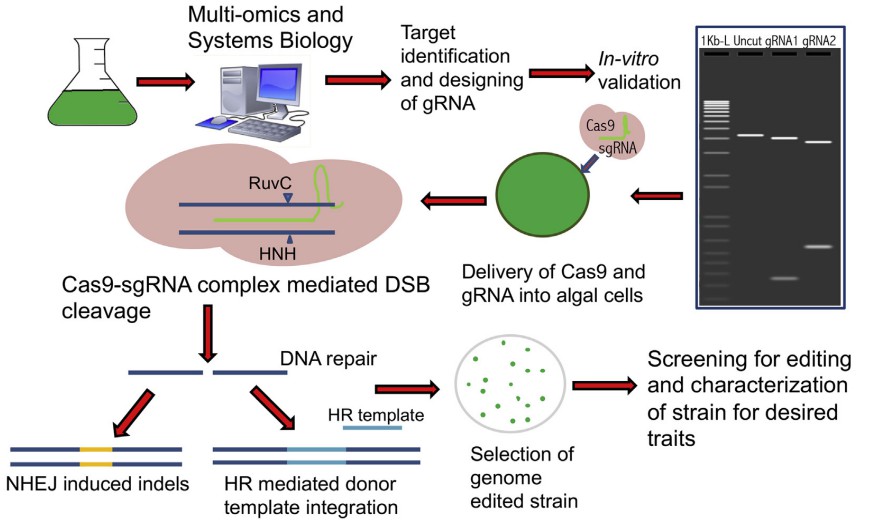Microalgae have a strong ability to adapt and survive in different habitats, leading to a great diversity in genetic traits and biochemistry. Currently, microalgae are used to obtain various commercially valuable products, and there is a desire to explore and develop alternative fuel sources. Since it is difficult for microalgae to possess all the desired traits, strain improvement and development are required. The gene editing technology of clustered regularly interspaced short palindromic repeat sequence (CRISPR) associated protein 9 (CRISPR-Cas9) allows editing (cutting and knocking out) specific sites on the genome more easily and has revolutionized genetic engineering in various model and non-model organisms. It promises an effective tool for improving algal strains to produce sustainable biofuels. Thus, applying CRISPR in microalgae may unlock the untapped potential of microalgal biofuels.
 Fig 1. Schematic workflow depicting a typical genome editing in algal species. (Tanwar A, et al., 2020)
Fig 1. Schematic workflow depicting a typical genome editing in algal species. (Tanwar A, et al., 2020)
Our solutions for comparative and functional microalgal genomics can analyze the possible functions of CRISPR short repeat sequences and identify different types of CRISPR systems and the presence of other Cas proteins encoding different DNA sequences between genomes. Thus, our skilled scientists have established CRISPR-Cas based genome editing in various microalgae species. Lifeasible provides professional microalgae genome editing services through CRISPR technology to our clients. Here, we offer multiple strategies to introduce targeted genome modifications based on the CRISPR/Cas9 system.
We feature a Cas9-driven type II system to help you target knock-in, knock-out, and knock-down of desired genes in microalgae. Our CRISPR-based microalgal genome editing solutions have been well received by customers worldwide and are widely used to:
We have successfully used the CRISPR-Cas system to manipulate the genomes of several freshwater and marine microalgae, enabling rapid and simplified microalgal genome editing. Depending on the microalgae species, we will design customized protocols for you to increase the efficiency of CRISPR-Cas tools to generate targeted mutants in these microorganisms. If you are interested in our solutions, please contact us directly.
Reference
Lifeasible has established a one-stop service platform for plants. In addition to obtaining customized solutions for plant genetic engineering, customers can also conduct follow-up analysis and research on plants through our analysis platform. The analytical services we provide include but are not limited to the following:
Get Latest Lifeasible News and Updates Directly to Your Inbox
Adaptive Evolutionary Mechanism of Plants
February 28, 2025
Unraveling Cotton Development: Insights from Multi-Omics Studies
February 27, 2025